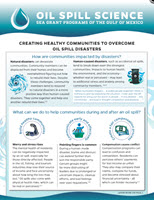
The Sea Grant Oil Spill Outreach Team released a publication that discusses how communities respond to a human-induced incident such as an oil spill as compared to natural disasters. Both types of events can affect the environment, economy, and human health; however, how people respond tends to be different.
Social scientists documented a series of shared effects on residents of the five U.S. Gulf Coast states following the Deepwater Horizon incident. They noted that unlike natural disasters when people tend to come together and help one another, human-induced incidents and related response efforts tend to cause discord. Feelings of stress, anger, and mistrust arise in affected communities, particularly among groups who feel their livelihoods threatened.
The fact sheet Creating healthy communities to overcome oil spill disasters outlines why scientists think certain groups exhibit these feelings and explains research about helping to alleviate or prevent these responses. The fact sheet also contains helpful links to organizations that can offer more information for individuals living in the aftermath of a human-induced incident like an oil spill.
Some of the information in this fact sheet came from earlier, more in-depth Sea Grant publications:
- Top five frequently asked questions about the Deepwater Horizon oil spill,
- The Deepwater Horizon oil spill’s impact on people’s health: Increases in stress and anxiety, and
- Is it safe? Examining health risks from the Deepwater Horizon oil spill.
The Sea Grant Oil Spill Outreach Team synthesizes peer-reviewed science for a broad range of general audiences, particularly those who live and work across the Gulf Coast. Sea Grant offers oil-spill-related public seminars across the Gulf Coast.
Information about upcoming Sea Grant science seminars and recently-held events is available here. To receive email updates about seminars, publications, and the outreach team or to ask a question, click here. To learn more about their work, visit their website.
************
GoMRI and the Sea Grant programs of the Gulf of Mexico (Florida, Mississippi-Alabama, Louisiana, and Texas) have partnered to create an oil spill science outreach program.
The Gulf of Mexico Research Initiative (GoMRI) is a 10-year independent research program established to study the effect, and the potential associated impact, of hydrocarbon releases on the environment and public health, as well as to develop improved spill mitigation, oil detection, characterization and remediation technologies. An independent and academic 20-member Research Board makes the funding and research direction decisions to ensure the intellectual quality, effectiveness and academic independence of the GoMRI research. All research data, findings and publications will be made publicly available. The program was established through a $500 million financial commitment from BP. For more information, visit https://gulfresearchinitiative.org/.
© Copyright 2010-2018 Gulf of Mexico Research Initiative (GoMRI) – All Rights Reserved. Redistribution is encouraged with acknowledgement to the Gulf of Mexico Research Initiative (GoMRI). Please credit images and/or videos as done in each article. Questions? Contact web-content editor Nilde “Maggie” Dannreuther, Northern Gulf Institute, Mississippi State University (maggied@ngi.msstate.edu).
